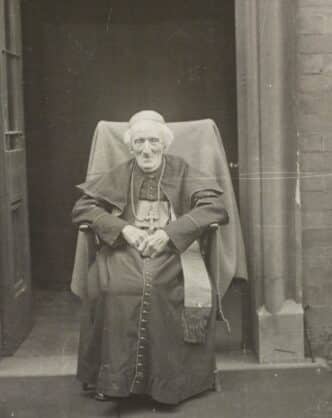St. Dymphna
Feast day: May 15
Virgin and martyr, St. Dymphna led an extraordinary life that was first recorded in the 13th century as one passed down by oral tradition. According to that tradition, St. Dymphna was born in Ireland, probably in the 7th century, and died in Geel, Belgium, murdered by her mentally ill father, who was trying to persuade her to marry him. It is these horrific circumstances which have made her the Church’s patroness and most powerful intercessor for the mentally ill. She has been venerated for many centuries in Geel, where a church honoring her was built in the 14th century and many miracles have been attributed to her prayers.
The daughter of a pagan chieftain and a Christian mother, St. Dymphna lost her mother at a young age but not before being secretly baptized. She was known to be like her mother in having great beauty and strong piety. St. Dymphna consecrated her virginity to Our Lord and the Blessed Mother in a vow of chastity.
However, her resemblance to her mother attracted her insane widowed father. To get away from her father’s incestuous desires, Dymphna fled to Belgium with a trusted priest and confessor named Gerebernus. In Geel, they built a habitation near a chapel dedicated to St. Martin of Tours and lived there as hermits. In his anger, Dymphna’s father pursued her and Gerebernus. Finding them in Geel, he ordered his attendants to execute Gerebernus. When Dymphna refused to return to Ireland, her father beheaded her. She was only 15 years old.
The bodies of Dymphna and Gerebernus were placed in a cave, where they were discovered in the 13th century. A brick in one of the tombs bore two lines of letters read as DYMPNA. Her body was moved to the site where the Church of St. Dymphna was later built. Many who visited this church and touched her relics were healed of mental illness, demonic possession, anxiety disorders and epilepsy. Known as the “Lily of Fire,” St. Dymphna has also been a powerful intercessor for runaways, incest victims and sexual and domestic abuse victims. Gerebernus is also recognized as a saint, and his bones were transferred to a site near Xanten, Germany.
St. Dymphna’s pilgrimage site in Geel became known for its compassionate care for the mentally ill. At first, sick pilgrims were housed in the church. Eventually, in the 17th century, an addition to the church was built with sick rooms for pilgrims. As these became overcrowded from the immense number of pilgrims, the town’s residents began bringing patients into their homes. This community-centered approach has continued to this day and is admired by many psychologists and psychiatrists as a humane way of dealing with the mentally ill. Patients are first admitted to an institution for observation and then taken into homes in Geel. The people of Geel are known for their readiness to help patients live a more normal life in a family environment.
Devotion to St. Dymphna has grown well beyond Belgium and Ireland, as more people become aware of mental health and abuse survivor issues. In Geel, a procession takes place on her feast day every five years. The local townspeople also stage a dramatization of her life and martyrdom.
Reflection
Dear God, give me a heart of compassion for all those suffering emotional or abusive distress. Help me to look for ways to include them in normal activities.
Prayer
O God, who gladden us today
with the annual commemoration of blessed Dymphna,
graciously grant
that we may be helped by her merits,
just as our lives are lit up by the splendor
of her example of chastity and fortitude.
Through our Lord Jesus Christ, your Son,
who lives and reigns with you in the unity of the Holy Spirit,
God, for ever and ever.







